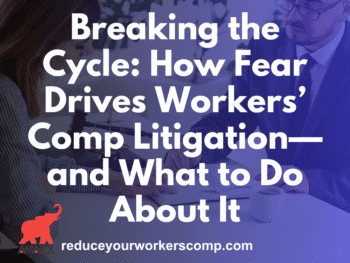Fact: Workers’ Compensation Insurance is a type of “property and casualty” business insurance required in all states, except Texas where an employer may opt out. It is referred to as a “line” of insurance coverage and is purchased from an insurance agent or broker.
Don’t Tempt Fate: Buy a Workers’ Comp Policy
Thousands of Texas employers and their employees are operating without an important safety net. Texas is the only state that allows private employers to opt out of the workers’ compensation system. About one-third do, according to the Texas Department of Insurance. Under Texas law, workers’ compensation benefits are the injured worker’s sole source of recovery from an employer who carries workers’ compensation coverage. That means that in most cases, injured workers cannot sue their employer for pain and suffering damages resulting from workplace injuries. Nonsubscribers do not have the same legal protection – they can be sued by employees in the event of a workplace accident. In 2006, a Houston construction worker fell 20 feet from a roof and was paralyzed. He sued his employer, claiming that the employer did not provide fall protection equipment or safety training. In July 2009, a Harris County district court issued a $20 million verdict in favor of the worker. Workers’ compensation insurance also takes care of your employees if they are injured on the job. Your policy will pay for their related medical expenses and replace a portion of their lost wages, for life if necessary. OCC/ACC policies, on the other hand, typically put a cap on injured workers’ taxable benefits. Furthermore, workers’ compensation wage-replacement benefits are not taxable; OCC/ACC benefits are. Some employers find that OCC/ACC policies are a good option for typical workplace injuries. But what about non-typical injuries? Consider an OCC/ACC policy with a $1 million coverage limit. That’s probably enough to cover the average slip, trip and fall injury. Quadriplegics, paraplegics and other seriously injured workers, however, could blow through that $1 million in a hurry. You could be on the hook for their remaining medical bills, which are likely to approach the $10 million mark. If the accident involves more than one employee, you’ll reach that $1 million limit even faster. You might reduce your premiums by choosing an OCC/ACC policy over a workers’ compensation policy. You have to consider, however, whether you have enough money to cover a catastrophic injury that you can’t possibly foresee.
Click Link to Access Free PDF Download
“How To Avoid, Manage, And Win Workers’ Comp Claim Litigation”
You need to analyze the risk as you make your choice. Talk to an agent who understands both types of coverage and can review the pros and cons of each with you. If cost is an important factor, you should know that Texas workers’ comp rates fell 30% between 2003 and 2008, according to the Texas Department of Insurance. Some carriers offer the opportunity for employers to further lower their premium by joining a group discount program and enrolling in a workers’ compensation health care network. By and large, Texas workplaces are safe. Private employers reported 69,320 nonfatal occupational injuries and illnesses involving days away from work in 2007, according to the U.S. Bureau of Labor Statistics. That’s a 4.65 decrease from the 72,660 reported cases in 2006. (workersxzcompxzkit) Still, no one can predict when a workplace injury will happen or how much it will cost. As a Texas business owner, you have the right to choose which kind of policy – if any – is right for your business. Choose wisely. We welcome as a guest author, Will Newton who is the executive director of the Texas office of the National Federation of Independent Business. Mr. Newton has kindly given permission to editors to “use this (information) in full or excerpt any part of it to use in stories about or relating to commercial insurance.” Follow NFIB at www.twitter.com/NFIB. We are accepting short articles* (300-800 words) on WC cost containment. Contact us at: Info@WorkersCompKit.com. *Non-compensable.
Visit Our Websites: Reduce Your Workers Comp: www.ReduceYourWorkersComp.com WC Books: http://www.reduceyourworkerscomp.com/workers-comp-books-manuals.php TD Calculator: www.ReduceYourWorkersComp.com/transitional-duty-cost-calculator.php
Do not use this information without independent verification. All state laws vary. You should consult with your insurance broker about workers’ comp issues.
©2009 Amaxx Risk Solutions, Inc. All rights reserved under International Copyright Law.



























